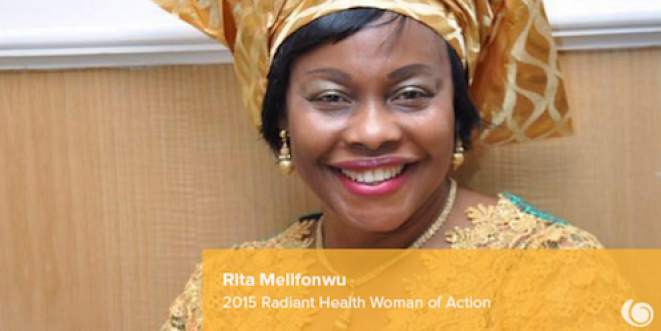Rita Melifonwu — A Champion for Stroke Care in Africa
By Chinyere AmobiPublished: November 24, 2015

The Radiant Health Women of Action is our list of inspiring women taking action to improve the health and well-being of African communities, whether on the continent or in diaspora.
Rita Melifonwu’s passion, vision and hard work have ignited a chain reaction in the campaign to raise stroke awareness in Nigeria.
A stroke occurs in Nigeria every 80 minutes, with roughly 168,000 new incidences of the medical emergency each year. With each case comes a different but often predictable set of problems.
For Rita Melifonwu, the disease hits close to home. Her favorite aunt had a stroke while on the way to market in Onitsha and was unable to receive the necessary emergency care. At the same time, Melifonwu began noticing a trend while in her position as a senior nursing sister at a local hospital in the London area.
“I realized that black and minority ethnic people are more at risk of strokes than their white counterparts, and that the [black] stroke survivors and their family members were unaware of stroke risk factors or how to prevent strokes,” says Melifonwu. She quickly resolved to work for stroke advocacy and awareness.
Melifonwu’s passion only intensified when she won the U.K. Department of Health’s 1999 Mary Seacole Nursing Leadership Award, which allowed her to conduct research that led to Stroke Action UK, the prototype for Stroke Action Nigeria.
In 2013 the Nigerian Federal Ministry of Health (FMOH) signed an agreement with Stroke Action Nigeria to implement a national Power to Stop Strokes campaign, create a stroke reference group and registry for the country, pilot a Life After Stroke Centre in Abuja, and support stroke education and training for health care professionals, supported by the Medical Association of Nigerians Across Great Britain (MANSAG).
As confirmation of the program’s ongoing success, on September 15, 2015, President Mohammadu Buhari gave the Nigeria Stroke Reference Group (NSRG) the mandate to advise the FMOH on the development of quality stroke services in Nigeria.
Still, despite Stroke Action Nigeria’s success, traditional views in the country can sometimes become barriers to success.
“Sadly, some Nigerians still forsake conventional medications and treatment for cultural and religious reasons,” says Melifonwu. “My take has always been to let people know that God created all things and to each one He called to a ministry. Therefore, the manufacturers of medicines and clinical experts that offer medical and surgical interventions must be walking in the areas of their calling. People are getting healed every day and lives are saved as a result of the work that these people do.”
[MORE]: See All the 2015 Radiant Health Women of Action
Like what you're reading? Sign up for our free newsletter and never miss a post! Plus get a FREE digital version of our Issue No.10 with sign up.

- Black Women Share Their Experiences with High Blood Pressure - September 24, 2021
- Breast Cancer Survivor VeRitta Smith on Self Care And Finding Purpose in the Midst of the Storm - February 13, 2019
- Filmmaker Adeyemi Michael Reimagines the Immigrant Narrative While Paying Tribute to His Mother in the Captivating Short Film, “Entitled” - May 8, 2019
- For Us, By Us: BLK + GRN Puts Natural Care Products for Black Women on the Map - May 2, 2019
- Flying Over 50: How Pole Dancing Helped 58-year Old Makeda Smith Reclaim Her Life - January 16, 2019
- Playwright Ngozi Anyanwu taps into her Nigerian-American upbringing for a play on grief and healing - October 19, 2018
- Cameroonian filmmaker Cyrielle Raingou on her upcoming documentary and her country on the brink of civil war - November 7, 2018
- Are Women ‘Hormonal?’ Yes, And So Is Everyone Else! - May 23, 2019
- How The All of Us Research is Restoring Trust and Bringing A Much-Needed Diversity to Medical Research - April 10, 2019
- Getting behind youth in the fight against HIV/AIDS in Nigeria - March 6, 2019











